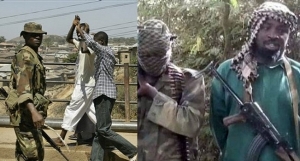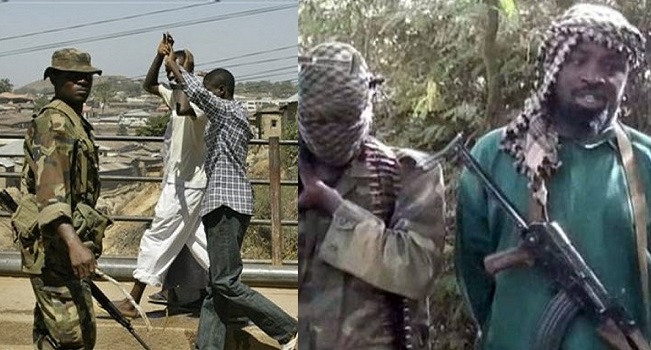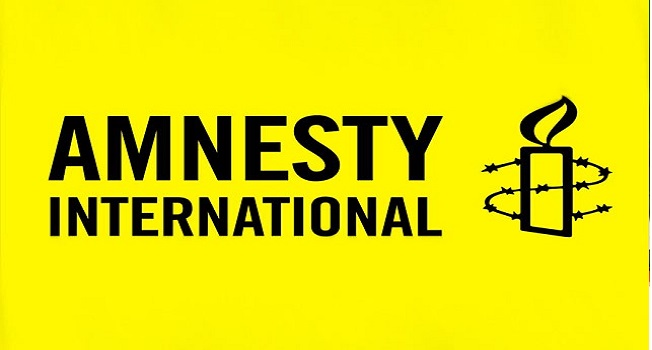
The human rights group also claimed that while the government had the obligation to investigate, and where appropriate, prosecute and punish crimes under international law, there have not been sufficiently prompt, independent and effective investigations into allegations raised by it and other organisations.
Amnesty International in a written statement to the 28th Session of the United Nations Human Rights Council, said the Nigerian security forces in its response to Boko Haram had committed serious human right violations. The evidence in Amnesty International’s possession suggests that Nigeria’s military has also committed crimes under international law, which may include war crimes and crimes against humanity.
Extrajudicial Execution
The agency added that it was concerned by the “deaths of more than one thousand suspects in military detention facilities as a result of extrajudicial executions, torture, starvation, disease, suffocation or other reasons associated with extremely poor conditions.
According to the group, there are extrajudicial executions by the military of men while in detention or upon arrest.
The statement also alleged that “on 14 March 2014, Nigerian soldiers executed more than 640 recaptured detainees in Maiduguri, after they were released during a Boko Haram attack on Giwa barracks.
“In August 2014 Amnesty International published video footage showing soldiers and CJTF members cutting the throats of six of these recaptured detainees in front of two open mass graves”, adding that “eyewitness accounts says nine people were killed in this way, while eight others were shot to death”.
Amnesty International further alleged that “the military has tortured suspects in custody and kept them in overcrowded cells, without access to adequate sanitary facilities, food, water or medical care,” insisting that “these conditions amount to cruel, inhuman or degrading treatment.
“The military has arrested large numbers of civilians since 2009 without reasonable grounds, including through using unreliable hidden informants to screen entire communities of villages and towns in Borno and Yobe states. The military has also arrested relatives of Boko Haram suspects in lieu of the suspect.
“In detention centres in the north-east and other locations in Nigeria, detainees have not had access to their families, lawyers or adequate medical attention. Those detained are allegedly held because they are members or supporters of Boko Haram, but most have never been charged and have not been brought before a court,” it maintained.
Immediate And Affective Measures
The group also noted that it has collected evidence showing that that Boko Haram has committed crimes under international law, including war crimes and crimes against humanity and called for Boko Haram to be investigated for crimes under international law, including killings of civilians, imprisonment and abductions, forced marriages, rape and sexual slavery, recruitment and use of child soldiers, pillage and targeting civilian objects.
Amnesty International urged the government of Nigeria to “initiate an independent, impartial, and thorough investigations into allegations of crimes under international law, including crimes against humanity and war crimes, committed by members of Boko Haram and the Nigerian military”, maintaining that “where sufficient admissible evidence is gathered, alleged perpetrators should be prosecuted in fair trials, without recourse to the death penalty.
“Take immediate and effective measures to guarantee the safety, security and protection of civilians and their property , and increase efforts to secure the lives and integrity of the civilians in accordance with its regional and international human rights obligations.
“Ensure that its security forces and members of the “Civilian Joint Task Force” adhere strictly to their obligations under international human rights law and international humanitarian law, in particular, ensure that detainees are protected from extrajudicial executions, torture and other ill-treatment and are treated humanely at all times.
“Ensure that no-one is arrested or detained in relation to the prevention, investigation or prosecution of crimes allegedly committed by members of Boko Haram in the absence of reasonable grounds to suspect them of responsibility for a recognisable criminal offence; Ensure that domestic law and practice relating to the detentions of suspects conform fully with international human rights treaties ratified by Nigeria as well as international human rights standards.
“Immediately ensure that no one is held in life-threatening or inhumane conditions and to this end, either immediately release all individuals detained by the military or ensure that they are transferred into the lawful custody of the police and brought immediately before a court to determine the legality of their detention.
“Issue invitations to the Special Rapporteurs on torture and other cruel, inhuman or degrading treatment or punishment, and on extrajudicial, summary or arbitrary executions to visit Nigeria.
Amnesty International also urged the Human Rights Council, its members and observer states at the 28th session, to call on Nigeria to respond positively to the requests to visit Nigeria made by the Special Rapporteur on the promotion and protection of human rights and fundamental freedoms while countering terrorism, in fulfilment of recommendations Nigeria supported at the 17th Session of the Universal Periodic Review (UPR).




